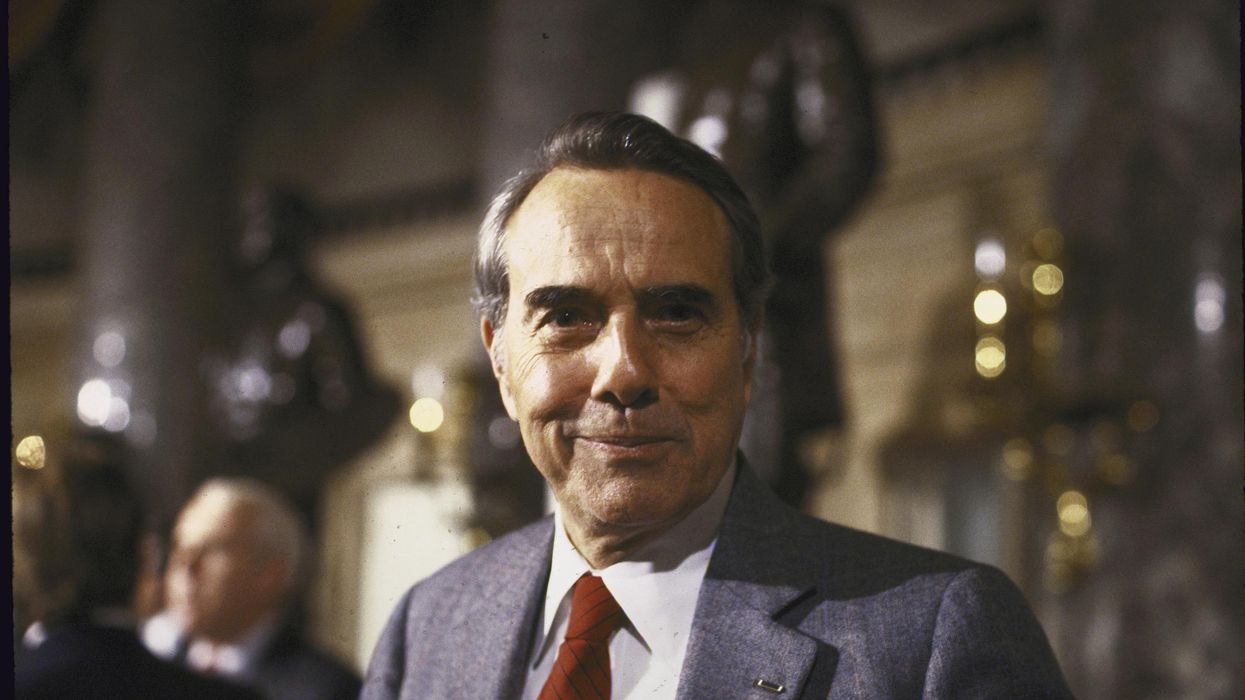Loeb is the author of “Soul of a Citizen” and “The Impossible Will Take a Little While.” An earlier version appeared in the Salt Lake City Tribune.
Sen. Joe Manchin’s Freedom to Vote Act, a compromise bill addressing voting rights, has been deemed dead in the wake of Manchin and fellow Democrat Kyrsten Sinema’s refusal to support a filibuster exception. But it still could be saved if one or two self-described moderate Republicans stepped up.
They’d follow the path created by the late Sen. Bob Dole when he helped save the Voting Rights Act.
The bill was up for reauthorization in 1982, two years before Dole became majority leader and 14 years before he won the Republican presidential nomination. Dole had voted for the original 1965 act, which Republican leader Everett Dirksen helped shepherd through. But Dirksen was long gone by 1982, and key Reagan administration officials, including future Justices John Roberts and Clarence Thomas, opposed the bill’s renewal. Just two years earlier, Reagan had criticized the act as “humiliating to the South.”
Dole, a strong conservative who’d defended Richard Nixon during the Watergate scandal, became involved through his businessman friend Leroy Tombs, a longtime Black Republican. As Tombs described, Dole was embarrassed that a voting rights bill was even needed, and he expanded the term of key sections to 25 years.
Dole’s bill included a key practical compromise, clarifying that members of a protected class didn’t have to be elected in numbers equal to their proportion of the overall population, thereby excluding quotas. Dole also clarified that those discriminated against didn’t have to prove discrimination was intentional, just that access to the vote was clearly being denied or abridged.
Once he’d drafted the compromise, Dole systematically engaged key Republicans, particularly Judiciary Committee members, to support his revised bill. He answered opponents’ arguments, persisted despite initial setbacks, and insisted that supporting African Americans’ right to vote was essential to “save the Republican Party,” to “erase the lingering image of our party as the cadre of the elite, the wealthy, the insensitive.” The Senate renewed the act, 65-8, and Reagan ended up signing it.
What if Lisa Murkowski, Mitt Romney, Susan Collins or any other Republican who claims to care about democracy acknowledged how gravely new state laws threaten our democratic process? And acknowledged, as many did in 1965 and 1982, that if states are undermining democracy then the federal government must respond? It’s nice for Murkowski, for instance, to join Manchin in arguing that the Voting Rights Act must be reauthorized, that federal oversight over places with a history of discrimination must be restored, and that “inaction is not an option.” But at this point inaction is the response and the destructive state voting laws and radically undemocratic gerrymanders are on track to prevail.
Like Dole’s 1982 legislation, a voting rights bill doesn’t have to address everything. Manchin’s compromise would go a long way toward addressing the worst abuses, even if it excluded elements of the original House bill that would strengthen democracy further. But for the compromise to pass, Republicans would have to provide 10 votes, which isn’t happening. Or one or more could make it a reality by bypassing the filibuster for voting rights legislation.
Citizens are rightly furious at Manchin and Sinema for failing to provide a pathway for Manchin’s own compromise to bypass filibuster rules and become law. They’ve done nothing to check the power of legislators who knowingly disenfranchised their fellow citizens. But that doesn’t let supposedly moderate Republicans off the hook. It’s their party that is currently disenfranchising people, so if they want fair and accessible elections, they need to do more than utter platitudes.
Otherwise, we will see no check on the wave of state laws suppressing voting, enshrining the most radical partisan gerrymandering, and wresting the power to count votes away from officials who’ve upheld the law honorably. That’s not even counting anti-”Good Samaritan” bills that make it illegal to even give water to the thirsty if they happen to be in line to vote.
Imagine if just one Republican senator backed ending the filibuster in this critical situation. That might create enough pressure for Manchin or Sinema to change their position. If two Republicans did it, the bill could be passed, even if they required a few modifications. They could be heroes instead of collaborators.
Bob Dole secured those key votes in a time when many Republicans were actually willing to support enfranchising all Americans, instead of fighting to prevent their voting. Alas, most now seem to regard democracy as expendable if it might hamper their gaining power. But any Republican could still play the role that Dole once did, standing up to defend the franchise.
I believe that most Republican senators know that the 2020 results were legitimate, and that the state bills introduced since do nothing but confer partisan advantage. The question is whether they can see past short-term political gain, to truly stand up for a government elected by all eligible Americans. The Bob Dole of 1982 shows that this can be possible.




















Trump & Hegseth gave Mark Kelly a huge 2028 gift